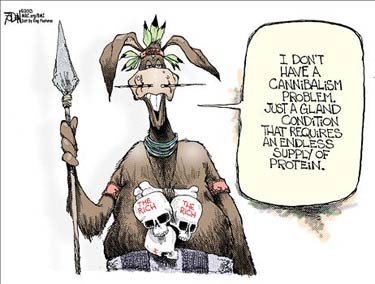
Kenneth Anderson penetrates through the general confusion about what the Occupy Wall Street protests are all about and explains that what we see is the indignation of the low-end intellectual clerisy left behind by more successful representatives of the same class.
The problem the New Class faces at this point is the psychological and social self-perceptions of a status group that is alienated (as we marxists say) from traditional labor by its semi-privileged upbringing — and by the fact that it is actually, two distinct strands, a privileged one and a semi-privileged one. It is, for the moment, insistent not just on white-collar work as its birthright and unable to conceive of much else. It does not celebrate the dignity of labor; it conceived of itself as existing to regulate labor. So it has purified itself to the point that not just any white-collar work will do. It has to be, as Michelle Obama instructed people in what now has to be seen as another era, virtuous non-profit or government work. Those attitudes are changing, but only slowly; the university pipelines are still full of people who cannot imagine themselves in any other kind of work, unless it means working for Apple or Google. …
The lower tier is in a different situation and always has been. It is characterized by status-income disequilibrium, to borrow from David Brooks; it cultivates the sensibilities of the upper tier New Class, but does not have the ability to globalize its rent extraction. The helping professions, the professions of therapeutic authoritarianism (the social workers as well as the public safety workers), the virtuecrats, the regulatory class, etc., have a problem — they mostly service and manage individuals, the client-consumers of the welfare state. Their rents are not leveraged very much, certainly not globally, and are limited to what amounts to an hourly wage. The method of ramping up wages, however, is through public employee unions and their own special ability to access the public-private divide. But, as everyone understands, that model no longer works, because it has overreached and overleveraged, to the point that even the system’s most sympathetic politicians understand that it cannot pay up.
The upper tier is still doing pretty well. But the lower tier of the New Class — the machine by which universities trained young people to become minor regulators and then delivered them into white collar positions on the basis of credentials in history, political science, literature, ethnic and women’s studies — with or without the benefit of law school — has broken down. The supply is uninterrupted, but the demand has dried up. The agony of the students getting dumped at the far end of the supply chain is in large part the OWS. …
The OWS protestors are a revolt — a shrill, cri-de-coeur wail at the betrayal of class solidarity — of the lower tier New Class against the upper tier New Class. It was, after all, the upper tier New Class, the private-public finance consortium, that created the student loan business and inflated the bubble in which these lower tier would-be professionals borrowed the money. It’s a securitization machine, not so very different from the subprime mortgage machine. The asset bubble pops, but the upper tier New Class, having insulated itself and, as with subprime, having taken its cut upfront and passed the risk along, is still doing pretty well. It’s not populism versus the bankers so much as internecine warfare between two tiers of elites.
This one is a must read.
Anderson is perfectly correct. Just as in places like Egypt and Tunisia, the penchant for empire-building on the part of the Academic industry combined with the general recognition of university education as the path to success and security led the United States to run through a vastly over-inflated system of ersatz higher education a large population with resulting delusions of self importance and entitlement and no means of satisfying them. Naturally, they think the system is unjust. Those other guys, over there, they have money and power, and we, the purer, nobler spirits, who majored in Afro-American Musical Traditions or Gender Inequity Studies are working in Starbucks. It’s so not fair! Rage against the Machine!
Hat tip to Megan McArdle.





